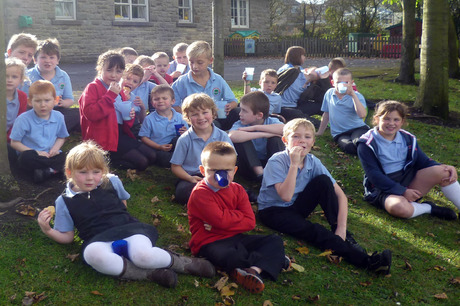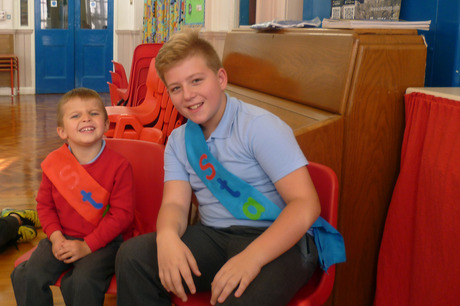of the Early Years Foundation Stage - in a whole-school approach aimed
at more flexible learning for all ages. Marianne Sargent reports

When Foundation Stage teacher Tessa Fenoughty took over as head of a small rural primary school last September, she had a vision that would completely transform the way teachers and pupils work together.
'The attraction for me, with being the deputy head and Early Years Foundaton Stage (EYFS) leader in my previous job, was that I wanted to have a school where I could take the ethos of the early years with more flexible learning and implement it in a whole school and I knew a small school like this would have the ability to make that change quite quickly,' Ms Fenoughty explains.
With only 35 children on the roll, Butterknowle Primary School in County Durham has just two mixed-age classes: Class 1, which is home to Foundation Stage and Key Stage 1, and Class 2 for children in Key Stage 2. Ms Fenoughty says not only the size of the school but the current educational climate has paved the way for her to implement a whole-school approach influenced by the principles of the EYFS.
'With the new National Curriculum coming on line, it's pared back and not so prescriptive, leaving teachers to teach in a more creative way, providing the opportunity to set up longer term projects using different subjects where appropriate,' she says.
'To me, that linking learning across the curriculum sat very well with the EYFS principles and practice. We still have the statutory requirements for our programmes of study, and we are still told what it is that pupils should be taught to do, but we're not being told how to do it and it does allow the more creative practitioners to take a few more risks.
'I actually think it's landed perfectly for me to take over a new school, a small school, with a creative curriculum that lends itself to the new National Curriculum requirements.'
ENABLING ENVIRONMENTS
The school has three teaching staff, including Ms Fenoughty, who works as a teaching head. 'It helps having a staff that were initially unsure but are now fully on board,' she says. 'I think it's been more enlightening for Key Stage 2 than it has for Key Stage 1 because the Class 1 teacher has to teach the EYFS alongside anyway so her practice is already very creative.'
The three teachers meet weekly and choose topics and themes together, looking for links that will lead into whole-school projects.
Ms Fenoughty explains: 'This term our theme is "Digging and Discovery". Class 1 are learning about the mining community, then in science they're exploring materials, looking at natural, living and non-living, and a lot of this all comes from the ground. In Class 2 their topic is "Stone Age". Although this is a history project we are looking at science and geology of rocks, which ties in quite nicely with the mining topic in Class 1 and the overarching theme of Digging and Discovery.'
She goes on to describe a project from last term centred around the World War I centenary. 'Our music was learning songs from the First World War and playing The Last Post on a range of instruments. In English we were writing poems and letters as if we were on the front and in history we were talking about the history behind it. We had a themed day where our dinner was World War 1 food and we do forest schools, so the Key Stage 2 children were making food that they would eat in the trenches.
'The Key Stage 1 children created their own war memorials because their topic for last term was "Marvellous Me", about themselves and their community. So we tied that to the World War 1 theme by going into the village to see the memorial, read the names and write them down. They came back and in the creative area they made their own memorial.'

POSITIVE RELATIONSHIPS
Ms Fenoughty is particularly keen to stress how applying the EYFS principles school-wide has impacted on children's behaviour and attitudes towards learning.
'In the early years, I've never used stickers, rewards and merits. I've never needed to because the children have been motivated and excited to learn. It's coercion to behave according to the establishment rules. It's externally controlled. Whereas we try to teach them in the early years about self-regulation and internal motivation.
'As a Foundation Stage teacher, I was always quite anxious when the children left me and went into Key Stage 1, where everything was rewarded with stickers and merits and the joy of learning was potentially lost because it was measured by how many house points you got. We teach these fantastic skills and then they are forgotten.
'In my school we've no merits, and no house points. We still have a star of the week but on a Monday we take the names out of a hat and then on the Friday we have a celebration assembly where I feed back positive comments about that child from other children and staff.'
Ms Fenoughty explains that rather than one child being singled out for doing something that everyone else is doing, leaving others feeling disappointed and let down, the children know they will all get a chance to be star of the week at some point.
'My expectations are that everybody will be a star all the time and we can celebrate that. The children are excited each week because they know it might be their turn and the spotlight is going to be on their behaviour,' she says.
But it has taken time to convince some parents, she adds: 'It's had its teething problems. I've had a few parents suggesting there's no discipline at the school and I've explained it's quite the reverse. It's about being able to self-regulate because that's what the children are going to need in the long term'.
In fact, some parents have commented on the positive impact it has had in terms of helping their children become able to manage feelings and behaviour. Ms Fenoughty offers examples of older children, who until recently had been exhibiting difficult and disruptive behaviour both at school and at home.
Taking time to work with these children individually, helping them to recognise their emotions and make links with their negative behaviours enabled them to verbalise their feelings and articulate their needs to the adults around them.
Affected parents have expressed their surprise at their children's ability to open up dialogue with them instead of lashing out in anger.
'You do spend a lot of time doing this in the early years, where you have to help them articulate what their needs are. But you can also do it with older children,' Ms Fenoughty says.

A UNIQUE CHILD
The recent policy changes in National Curriculum assessment have come at an ideal time for Ms Fenoughty, who believes assessment should take account of individual children's maturity, development, interests, needs and abilities rather than use a 'best-fit model'.
'The removal of National Curriculum levels and change in the language of assessment that seems to be coming into place, where a child is "working towards", "working at" or "working at a greater level" sits nicely with the EYFS, where children are described as "emerging", "meeting" or "exceeding" at the age related expectations,' she says.
Ms Fenoughty explains that a school run in accordance with the principles of the EYFS is more able to respond to the individual needs of its pupils. However, she does recognise the benefits of having so few children on the roll.
'I didn't want to take on a headship in a big school where I couldn't stick to my principles, which are very much influenced by my EYFS experiences. I've been involved with early years for the past 15 years and this has had a big impact.
'If you look at the principles of the EYFS there's some really good stuff there that I can hang my hat on and I haven't had to leave those principles in the leadership and management of a whole school, which I think is probably quite unusual.'
MORE INFORMATION
- Beginning Teaching, Beginning Learning by Janet Moyles, Jan Georgeson and Jane Payler
- Butterknowle Primary School, www.butterknowle.durham.sch.uk/welcome
- Carrying on in Key Stage 1 series by Sally Featherstone, Ros Bayley and Lynn Broadbent
- Starting from the Child by Julie Fisher.









